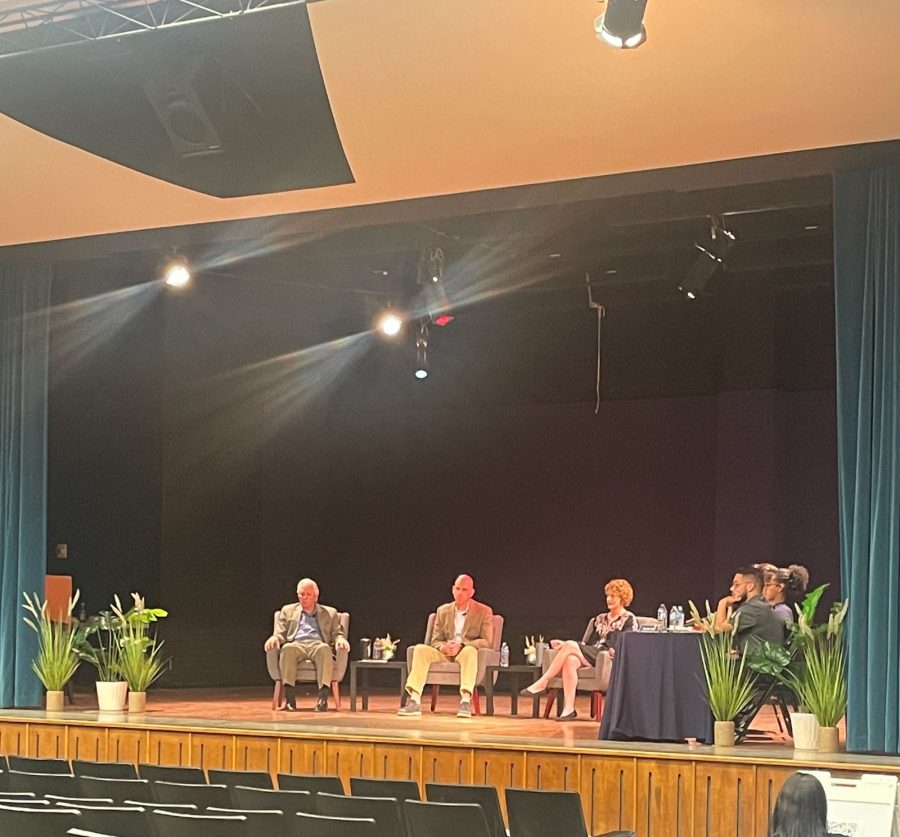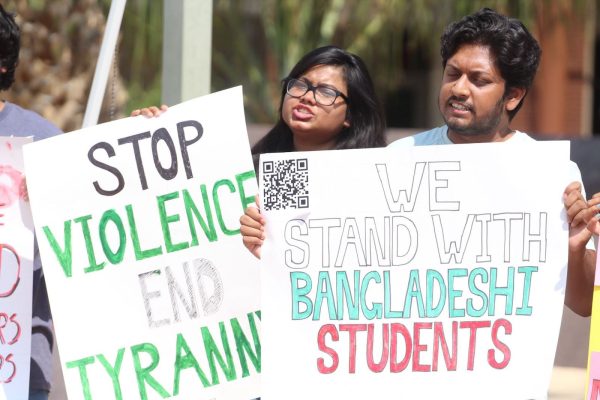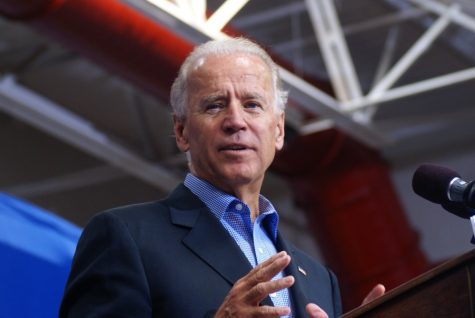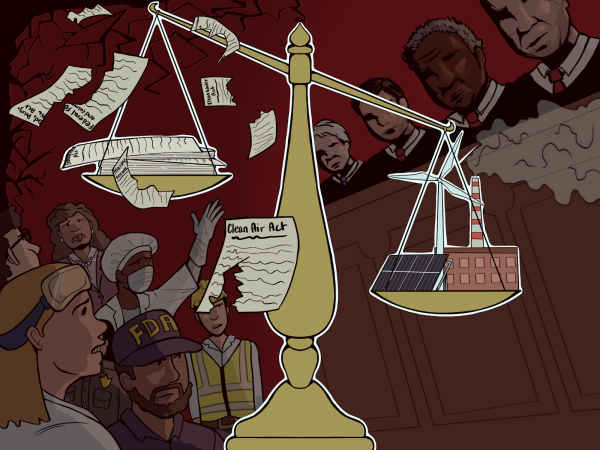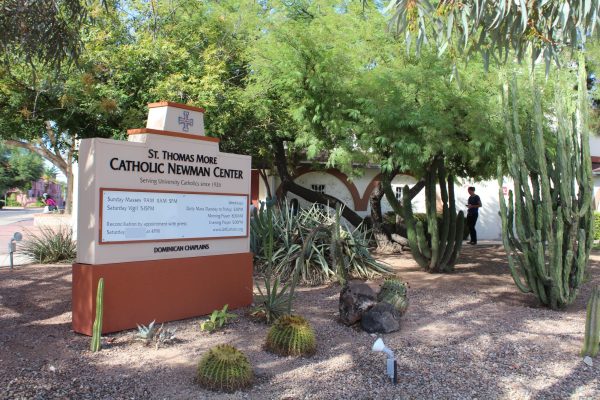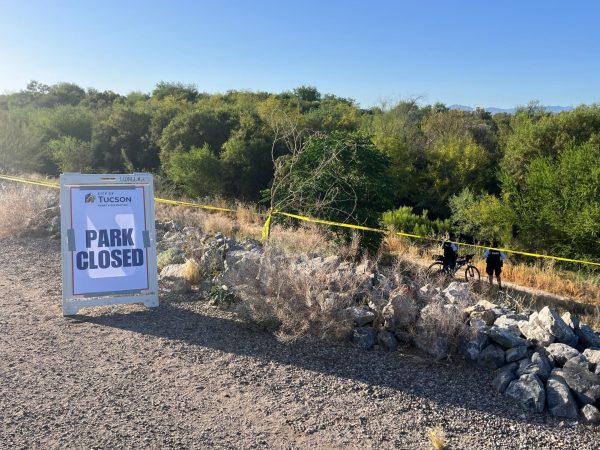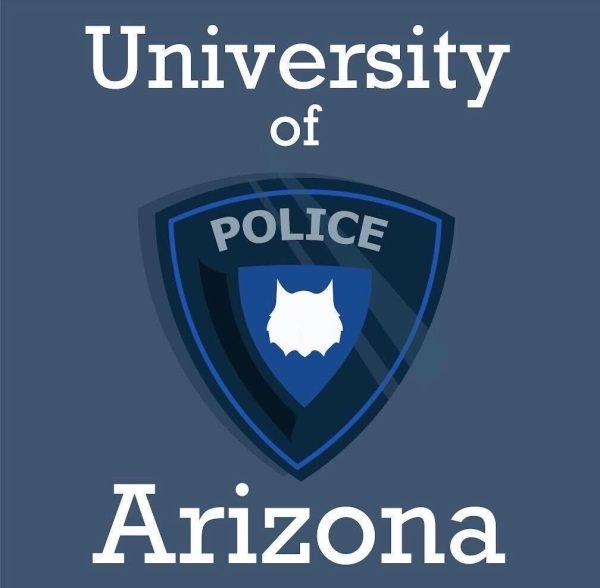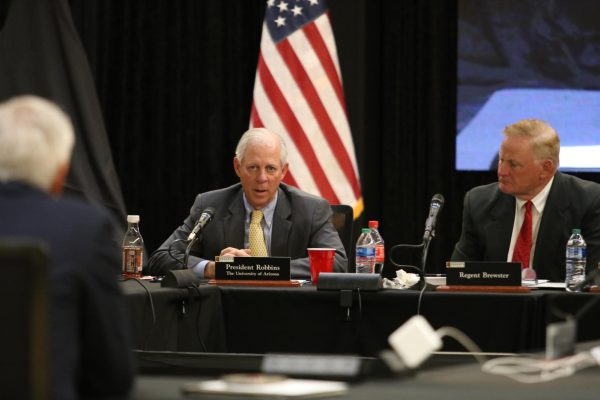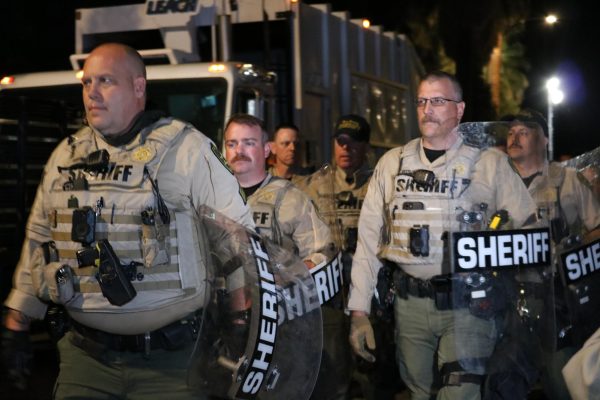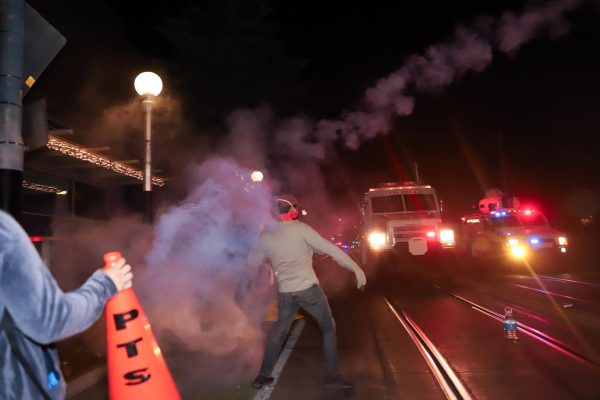ASUA leads student safety panel: UA leaders talk next steps for safety
A group of panelists, including President Dr. Robert C. Robbins and CAPS leadership, speak at the Student Safety Forum hosted by ASUA on Friday, April 28.
May 1, 2023
The University of Arizona’s student government held a Student Safety Forum Friday, April 28, to discuss ongoing community concerns about the school. Students were able to submit questions in advance to the panel, which included UA President Dr. Robert C. Robbins, Independent Safety Contractor Steve Patterson and Counseling & Psychological Services leadership.
The first topic involved the Vice Provost for Campus Life and Dean of Students Kendal Washington White. Many members of the campus community — most outspokenly being the student-run Coalition of Black Students and Allies group — have demanded that she resign or be terminated for several weeks now.
Some of the things students said they were unhappy with include Washington White calling the police on a Black, trans student; her presence at and inaction in the face of a graphic anti-abortion protest on the UA Mall and her handling of the funding and staffing of campus cultural centers.
Robbins indicated that he felt that students’ concerns were legitimate. While he didn’t directly acknowledge the role of Washington White, Robbins stated that there is a lack of non-police crisis response on campus.
“Where do we go if we feel that we need help without calling UAPD and having people with guns show up?” Robbins said, “I think there has got to be mental health providers that, when a call comes in, can mitigate disagreements and de-escalate the situation.”
Patterson agreed.
“I think there’s a gap there between having a potential law enforcement issue and just a general dialogue and discussion,” Patterson said. “Is there some mechanism, some group that can handle some of these situations? It’s something that I definitely need to consider and do some research on to see if we can create some system or entity to deal with that.”
A member of CAPS leadership mentioned that this notion of an alternative crisis-response group is something that CAPS has been working towards.
More specifically, the proposal includes a “team of licensed mental health counselor and crisis case managers who could serve the function of responding when there is an escalated situation or mental health crisis on campus […],” with the goal of “reducing the numbers of instances where we have to call on UAPD to […] respond to escalated situations to which the presence of a police officer could be triggering, escalate the situation, or present danger to a student who may carry a historically marginalized identity.”
ASUA President Patrick Robles then steered the conversation towards the topic of militarization, citing student concerns about balancing campus safety and security measures that some community members view as militarization.
Robbins said this is not and will never be the intention of UAPD.
“We’re a university police force. We’re not one that will ever be militarized,” Robbins said.
Patterson reiterated this point, acknowledging that, “there seems to be a disconnect of communication between UAPD and the campus community […]. If there is a reason why there is a lack of comfort then we need to work through that.”
Robbins and Patterson emphasized that part of the beauty of the UA campus is the fact that it is open and always will be. Robbins described a vision of alumni and their families walking around the UA Mall and enjoying the beautiful weather, emphasizing that preserving this — along with safety — is a unique challenge.
The CAPS representative echoed similar points, reiterating that working towards the balance that Robbins and Patterson discussed has been disrupted by the plethora of security incidents in the 2022-23 academic year. She also said she believes more police is not the solution to these campus issues.
The theme of finding a balance continued, as Robles brought up the balance of free speech and hate speech in the context of the anti-abortion demonstration on the mall.
Patterson noted that throughout his career, this has been a common struggle and there is no clear answer.
“If we start restricting one thing, where is that line drawn?” he asked.
Robbins pointed out that a solution to protecting the mental health of students during these types of demonstrations could be notifying them beforehand. Robbins asked Robles if this is something that ASUA had inquired about before.
“We actually met with Kendal Washington White last Friday and we had asked her about this. She had said no to alerts,” Robles said.
“What was the reason for that?” Robbins asked.
Another ASUA representative jumped in, explaining that “[Washington White] wanted to ensure that they didn’t bring more individuals like this to campus.”
“I think that should be a discussion. I think we should be informed about what’s going on on campus,” Robbins said.
The final subject before closing statements was maintaining accessibility for disabled students in light of new security measures.
“The goal is by the fall term to have locks on every classroom,” Robbins said.
Patterson added that they will be paying special attention to being Americans with Disabilities Act compliant when it comes to moving forward with new leadership and oversight around campus safety initiatives.
“We will formally announce that, I believe, next week. It will be a diverse group with numbers of faculty, students, staff, etc. We will have our first meeting next week,” Patterson said.
At the close of the panel, the panelists emphasized their ultimate goals moving forward.
“I look forward to continuing to engage,” Robbins said. “I will be out and about and I will encourage others to do it.”
Patterson noted the ultimate challenge is making people feel safe.
“If there’s anything that I can do to help in that process, that’s what I’m going to do,” Patterson said.
Follow Bailey Ekstrom on Twitter



